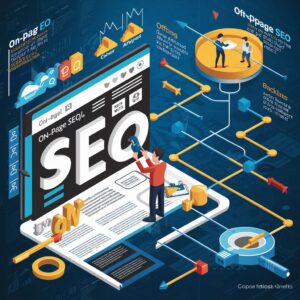
what is on page SEO ?
On-page SEO, also known as on-site, refers to the practice of optimizing individual web pages to rank higher and earn more relevant traffic in search engines. It involves various elements that are directly within your control on your website. These elements include content quality, HTML structure, and site architecture.
Content Quality: High-quality, relevant, and informative content is crucial for on-page. This includes using targeted keywords naturally within the text, headings, and subheadings. Content should be valuable to readers, answering their questions and providing solutions to their problems.
HTML Structure: Proper use of HTML tags plays a significant role in on-page. This includes using title tags, meta descriptions, header tags (H1, H2, H3), and image alt tags. Title tags should be unique and descriptive, accurately reflecting the content of the page. Meta descriptions, while not a direct ranking factor, influence click-through rates from search engine results pages (SERPs).
Site Architecture: A well-structured website is crucial for both user experience and search engine crawling. This involves having a clear, logical structure with internal links that make it easy for users and search engines to navigate. URL structure should be clean and descriptive, using keywords where appropriate.
By focusing on these elements, you can improve your website’s visibility in search engine results, driving more organic traffic and increasing the likelihood of conversion. On-page SEO is an ongoing process, requiring regular updates and adjustments to keep up with search engine algorithm changes and evolving user behavior.
what is oFF page SEO ?
Off-page SEO refers to all the activities conducted outside your website to improve its search engine rankings. Unlike on-page SEO, which focuses on optimizing elements within your website, off-page emphasizes building authority and relevance through external factors. The primary objective of off-page is to increase your website’s credibility, relevance, and trustworthiness in the eyes of search engines and users.
Social Media Engagement: Active participation on social media platforms can significantly boost your off-page SEO efforts. Sharing your content, engaging with your audience, and fostering a community around your brand helps increase visibility and drive traffic to your website. Social signals, such as likes, shares, and comments, indirectly influence your search engine rankings by demonstrating your content’s popularity and relevance.
Brand Mentions: Even without a direct link, mentions of your brand or website across the web contribute to off-page. These mentions, whether in forums, blog posts, or news articles, help establish your brand’s authority and recognition. Tools like Google Alerts can help you monitor and capitalize on brand mentions.
Influencer Marketing: Collaborating with influencers in your niche can enhance your off-page. Influencers have established credibility and large followings, and their endorsements can lead to increased traffic and backlinks to your website.
Local SEO and Citations: For businesses with a physical presence, local SEO is crucial. Ensuring your business is listed accurately in online directories, such as Google My Business, Yelp, and local business directories, helps improve your visibility in local search results.
In conclusion, off-page is essential for building your website’s authority and driving organic traffic. By focusing on backlink building, social media engagement, brand mentions, influencer marketing, and local SEO, you can significantly enhance your search engine rankings and overall online presence.
difference between on page SEO and OFF page SEO
On-Page SEO
- Definition: Optimization techniques applied directly on your website.
- Focus: Enhances content, HTML structure, and site architecture.
- Control: Fully controllable by the website owner.
- Key Elements: Includes keywords, meta tags, header tags, and alt text.
- Content: Emphasizes high-quality, relevant content creation.
- HTML Tags: Involves optimizing title tags, meta descriptions, and headings.
- Website Architecture: Enhances site navigation, user experience, and crawlability.
- Backlinks: Does not involve acquiring backlinks.
- Social Media: Not directly involved in social media activities.
- User Engagement: Improves user engagement through better content and design.
- Monitoring: Uses on-site analytics and SEO tools for tracking.
- Cost: Typically lower, focusing on content and site optimization.
- Timeframe: Changes can show quicker results.
- Impact: Improves usability, relevance, and keyword targeting.
Off-Page SEO
- Definition: Strategies conducted outside your website to boost rankings.
- Focus: Builds website authority and visibility through external factors.
- Control: Not fully controllable, relies on external entities.
- Key Elements: Includes backlinks, brand mentions, and social signals.
- Content: Focuses on external content perception and sharing.
- HTML Tags: Does not involve HTML tag optimization.
- Website Architecture: Does not directly affect site structure.
- Backlinks: Heavily relies on acquiring high-quality backlinks.
- Social Media: Involves social media engagement and marketing.
- User Engagement: Indirectly influences engagement via external referrals.
- Monitoring: Tracks backlinks, social signals, and external mentions.
- Cost: Can involve higher costs for outreach and PR campaigns.
- Timeframe: Efforts generally take longer to reflect in rankings.
- Impact: Enhances authority, credibility, and external validation.
